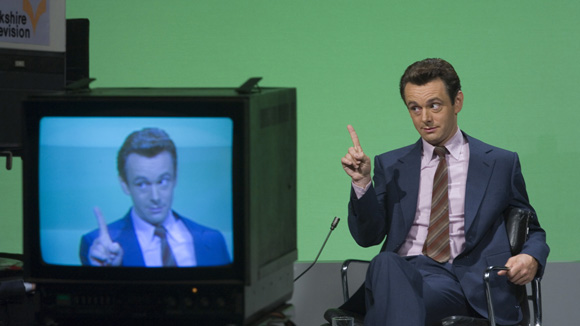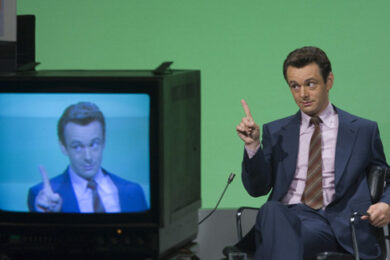Click here to see our gallery of Sports Films That Weren’t Shit.
For all the praise heaped upon it, mostly by people who don’t read much, The Damned Utd is David Peace’s weakest book. A fine piece of work for sure, but arriving after the strong meat of the Red Riding novels and GB84, it’s a trifle. An impressionistic sketch of Brian Clough’s doomed spell at Leeds United in 1974 (and his loathing of ex-Leeds boss Don Revie), it’s fascinating – because Clough was fascinating – but doesn’t tell us much about Clough, paranoia, self-doubt… anything. Its strength is Peace’s one great strength: a heightened sense of tension, a stuffy and unsettled atmosphere which only the wildly optimistic might think suitable for cinema. Any such optimism is dashed by The Damned United (and note that change of title – an abbreviation spelt out, needlessly).
It never bodes well when a director leaves a project before it’s underway, as Stephen Frears left The Damned United. "I loved the book, but couldn’t work the film out in my head,” Frears has said. “I’d set out in pursuit of something that was leading me down a blind alley." Though it takes place entirely within Clough’s spinning head, the novel is not unfilmable, but a close adaptation would mean gambling, pushing the audience where they might not wish to go. Fat chance of that one flying, in what was to be sold as “a football film”. Tom Hooper, replacement director, has pitched the film between a made-for-TV biopic and a rom-com, Clough and his sidekick Peter Taylor – who chose not to join him at Leeds – as estranged lovers who just can’t make it alone. It’s silly, it’s simplistic, on occasion it’s excruciating. Perhaps it’s the film that Frears feared he’d be forced, in the end, to make.
Certainly, it’s nothing like the book – any nods to Peace’s work are vague and superficial. They’re also jarring, since they highlight the film’s complacency. The book moves back and forth in time, between glory at Derby and the horror at Leeds; this is wearying, but it happens for a reason (to emphasise Clough’s internal restlessness, an obsession with things to live up to, or live down). The film does the same, with no real purpose, so that here those flips seem forced and baffling. Characters give ludicrous speeches, blurting out what Peace could suggest subtly: inner monologue displaced by dialogue. It’s distracting, and ultimately pointless, since The Damned United is directed like an advert – banalised, beautified, emptied of meaning.
Not that it’s incompetent, or totally without merit. It does capture the cobwebbed pomposity of football club chairmen, and the fusty FA establishment: at Billy Bremner’s disciplinary hearing, a portrait of the Queen sits top-centre of the screen, dividing the workers from the game’s top brass. Clough’s first defeat of Revie, as his Derby side gub Leeds, is handled quite smartly: Clough shut in his office unable to watch, absorbing the cheers through a frosted window (which sidesteps the need for a badly-faked football match, always a clanger in football films). But there’s no depth, no darkness… no Damned Utd. This is a slight and sentimental comedy, cruising on period detail, which swaps Peace’s vision of the past – a nightmare that bleeds into the present – for cheap, chuckling nostalgia, the fatuous gaiety of Seventies Night. And it doesn’t even look like the Seventies – not really. The Elland Road fans could be the Arctic Monkeys, with smooth shiny hair and gleaming leathers. Establishing shots of Brighton are so clearly filmed in the 21st century, they might as well have had Cheryl Cole in them. If you’re going to do it, at least do it right. Some of us are old and fussy.
Much has been made of Michael Sheen’s performance, but there’s one obvious problem with any portrayal of Brian Clough: in his day, he was impersonated to death. It’s like making a film about Frank Spencer, or Benny from Crossroads. Sheen, to his credit, plays it straight, but it still feels like caricature, as though at any moment he’ll pause, turn his back, and spin round wearing a fez – “just like that!” Of the rest of the cast, some have been picked on appearance alone (Colm Meaney, a ringer for Revie, can’t quite capture his Anglo-Saxon stoniness), while some look so unlike their subjects it’s hilarious – the real-life Billy Bremner may not have been so widely feared, had he worn a joke-shop wig. Timothy Spall tries hard as Peter Taylor, but this crucial role is thankless and badly written; only Jim Broadbent really succeeds, as Sam Longson, Derby’s puffed-up chairman. He even wrings the film’s one laugh from a throwaway reference to “Evel The Knievel”.
The script feels hurried, and often clumsy. Anachronistic language abounds (Clough calls Dave Mackay a “fat fuck”), and there are some monstrous info-dumps, great tottering wodges of artless exposition. Spall is regularly hung out to dry: “You’re the shop window,” he shouts at Sheen, “but I’m the goods in the back!” This phrase was, according to Taylor, a private joke between friends – used in anger, it’s beyond embarrassing (and if you have any doubts, try shouting it at someone right now). The low point comes as Clough bawls out Longson for refurbishing the directors’ box, rather than investing in players: he accuses the chairman of being more interested in “prawn sandwiches” than football. In the darkness, I covered my eyes. Who the hell thought this was clever?
Screenwriter Peter Morgan has suggested that the softening of Peace’s protagonist was at least in part a sop to Clough’s family, who complained that the book portrayed him unfairly as drunken, foul-mouthed, obsessively bitter. And yet, while infinitely lighter in tone, the film is in truth less flattering still. This Brian Clough seems not just petty but a small man, choking on frustrated hero-worship – of Don Revie, no less. According to The Damned United, this resentment dated from the day that Leeds played Derby in the cup, and Revie failed to shake Clough’s hand, or share a bottle of wine in his office. Well, now – Clough’s dislike of Revie was in part personal, and surely stoked by jealousy, but it was rooted in a deep disapproval of Revie’s approach to the game, his cynicism and unprincipled pragmatism. To underplay this is to belittle Brian Clough, wave away his passions, undermine his life’s work. But hey, it’s fiction, right? Peace’s book used that get-out clause to access areas no biographer could touch, to extend the character; the film sees it as something to fall back on, and reduces the man, rewriting history to better fit its own simplistic, silly-arsed scenario.
The climax of the film, and culmination of this unfortunate tendency, is a recreation of Clough and Revie’s clash on Yorkshire TV’s “Calendar”, on the evening of Clough’s sacking. Revie arrives in the studio unannounced – which he didn’t – and takes Cloughie to the cleaners (which again, he didn’t). Anyone who’s seen the original clip will be stunned at the liberties taken here, changes made for dramatic effect which only deflate the very real drama of that footage. It’s an electrifying clip, Clough clearly wounded but dancing defiantly, Revie concealing a shameful joy behind tight-lipped, frosty formality. The eye contact, the moments of silence, the changes in tone, the shifting balance of power – it’s impossible to look away. None of this makes it to The Damned United, in which Clough whines that Revie never shook his hand, and Revie responds with a string of sneering put-downs, leaving our hero speechless and humiliated. This is total fantasy – and the problem is not that it misrepresents reality, but that it falls so far short of that reality, which has (like most things here) been reshuffled, rewritten and stripped of all subtlety. It’s as though, in sweeping out the darkness of The Damned Utd, the film-makers felt themselves sliding towards hagiography, and re-salted Clough with flaws of their own invention. The result is not balance, it’s an unedifying mess.
Not that The Damned United is unwatchable – drunk in an armchair on Boxing Day, you’d probably enjoy it. As films about football go, it’s rather good (since films about football are without exception dreadful, this is not high praise). The problem is that it takes the Seventies and, like so many recent works, dampens the decade’s resonance, whittling it down with a smug little chortle to outmoded menswear and tasteless interior decor. The problem is that in trying to portray Clough in a safer, softer way than Peace’s novel, it makes him seem childish and a bit of a chump. The problem is that The Damned United could – and should – have been a damn good film, and it bloody well isn’t. It’s lightweight and lazy. It reeks of cowardice; it lacks vision, the wit to impose itself, the guts to go out on a limb. What miserable irony, then, that its subject is Brian Clough. What miserable irony, that it’s one more British film with nothing much to say.
Click here to see our gallery of Sports Films That Weren’t Shit.



